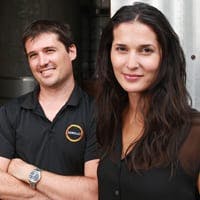This week’s Friday Entrepreneur Fix features Ruth Gallace, one half of the entrepreneurial duo behind the country’s only 100 percent pure fruit cider range Cheeky Rascal, and with 880 percent growth in the last year alone, business is booming.
Cider’s what all the cool kids are drinking at the moment and entrepreneurial couple Ruth and Matt Gallace are successfully tapping into this new, lucrative trend.
The owners of Rebello Wines in Victoria’s Mornington Peninsula saw the strong following cider had in the United Kingdom and knew it was only a matter of time before Australian consumers got a taste for it.
So they launched Australia’s first 100 percent pure fruit cider blend and it flew off the shelves.
The trial run of 1,000 litres sold out before production had finished and the pair’s had to buy extra tanks to keep up with booming demand and rolling 45,000 litre batches. Rebello’s seen 880 percent growth in the last year alone and its Cheeky Rascal Cider range has expanded to seven drinks and is now stocked in premium liquor stores across the country.
But the Gallace’s have no plans to slow down any time soon, with Ruth telling Dynamic Business she’s got big plans to continue innovating in the cider space. Market share is the ultimate goal and this entrepreneur’s got the big brewers in her sights.
How do you balance your husband and wife relationship, with your professional relationship?
It takes a bit of discipline. We have two young children, so in our personal time there isn’t much time for business, the children are good at keeping us focused on family.
Outside of business hours, if either of us doesn’t want to talk about business we’ll respect the other’s wishes, because we all need some down time.
We also have a rule that if we are going to talk about business after hours, it can only be positive aspects. We don’t want to get bogged down in anything too cumbersome after hours!
Do you think there are any negatives to being an entrepreneur or small business owner?
There’s a flip side to every downside. So for all these negatives, you could also see them as a positive!
But, I do feel a really big level of responsibility to manage our staff properly. We’ve gone from three employees to 11 full-time staff in 12 months, so there’s a big input in managing staff and I find that responsibility quite full on. I have been in managerial roles before, but when you work for someone else you can switch off at the end of the day. When you own a business, you hire people, so you’ve got to look after them.
I also do struggle to switch off, so I guess the other issue is that the line between your personal life and professional life get blurred, because at the end of the day they’re your customers and you need to make sure they’re well taken care of. You hope your staff feel the same level of responsibility, but you can’t assume they do.
Have you managed to achieve work/life balance, or do you think this is a myth?
I think you need to have different expectations of what work/life balance is. What I’ve learnt is that you need to have different expectations based on what stage of your growth your business is in, even within your production cycle or marketing cycle – because there’s going to be different demands on you.
We’re kind of all or nothing when we’re in the midst of work or when we’re rolling out a new product, but then the flip side is we can take a few extra weeks holiday that people who work for someone else might not be able to do.
How have you managed such rapid growth over the past 12 months?
It’s been very well managed, because cashflow is so critical to any business that’s growing as quickly as we are. We’ve had to be across every decision made and we’ve forecasted every move to see what the consequences will be and planning for every situation.
Although our growth has been very opportunistic, there’s been a lot of planning behind it. We’re very aware of what our capabilities and strengths are.
How important do you think it is for a small business to be continually innovating?
Innovation is very important for us, but I’d be cautious to generalise for all small businesses and entrepreneurs because it’s dependent on each market.
Because everything in life today is so instant, consumers are excited by something that’s new. Having said that though, I don’t think you should innovate for the sake of innovating. You need to identify gaps in the market and stick to your area of expertise, don’t just try to roll out crazy ideas with no substance!
What’s the biggest business lesson you’ve learnt as CEO of Rebello’s?
There are a few philosophies I go by. If something’s meant to be, I think it will happen quite naturally. I find when I’m working on a project and I keep coming up against obstacles, hindsight ends up showing me those projects weren’t quite worth it. As a business owner, you have to prioritise, so you need to be selective and objective about what projects you choose to pursue, because otherwise you waste energy and resources on things that aren’t worthwhile.
Watching cashflow in times of growth is also absolutely crucial. I think people talk about this a lot, but don’t necessarily follow through with it.
Any hints for what’s next?
We’ve got a few new product innovations coming up, but I can’t reveal too much yet. We’ve got something pretty special coming for winter, and a couple of new products for summer.
Our other goal is really to continue to let customers know about who we are. You know, that we’re the only Australian owned 100 percent fruit cider business, we want to spread that message and build market share.

